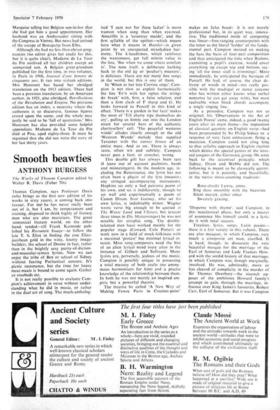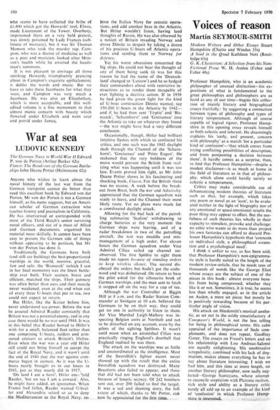Smooth beawties
ANTHONY BURGESS
The Works of Thomas Campion edited by Walter R. Davis (Faber 70s) Thomas Campion, says Professor Davis (who brings us the first new edition of his works in sixty years), is coming back into favour. For men he has never really been out of it, but I am, by temperament and training, disposed to think highly of literary men who are also musicians. The great unmusical literary world, on the other hand, tended—till Frank Kermode pub- lished his Romantic Image—to follow the late T. S. Eliot in finding the true Eliza- jacobean gold in the witty, knotty image- builders, the school of Donne in fact, rather than in the brightly sexy purity-of-diction- and-muscular-syntax lyrists. Now we can enjoy the tribe of Ben or school of Sidney without fearing Puritanical censure. It's picnic sustenance, but the time for heavy meat-meals is bound to come again. Gather ye rosebuds etc. It is not really possible to evaluate Cam- pion's achievement in verse without under- standing what he did in music, or rather in the dual art of song. The much-antholog- ised 'I care not for these ladies' is more wanton when sung than when eye-read. Amarillis is a 'countrey maide', and the first syllable of the epithet—which means here what it means in Hamlet—is given point by an unexpected mixolydian har- mony. The k-headrimes, which reinforce the wantonness, get full minim value in the line, 'But when we come where comfort is'. The tune itself, a deliberate harking back to the old jig or 'poulter's measure', is delicious. There are not many fine songs in the world, but this is one of them.
In 'When to her lute Corrina sings', Cam- pion is not slow to exploit harmonically the line 'Ev'n with her sighes the strings do break' with, first, a false relation, and then a firm clash of F sharp and G. He looks forward to Purcell in this kind of effect. 'There is a garden in her face' makes the most of 'Till cherry ripe themselves do cry', pulling us firmly out into the London street for several bars of the authentic cherrysellers' call. 'The peaceful westerne winde' alludes clearly enough to the old 'Westron Wynde' melody that supplied Taverner with the camas firnues of an entire mass. And so on. There is always taste, often wit and subtlety. Campion never puts a foot, or crotchet, wrong.
This double gift has always been rare (I leave out of account psalmists, bards and minnesingers). In the modern age, in- cluding the Renaissance, the lyrist has not often been a player of the lyre (meaning any stringed accompanying instrument). Hopkins set only a bad patriotic poem of his own, and set it indifferently, though he set well and experimentally a poem of Canon Dixon. Ivor Gurney, who set his own lyrics, is indubitably minor. Wagner wrote verse big enough to be quoted in The Waste Land and Ulysses, but (except three times in Die Meistersinger) he was not notable for strophic song. The double- talented men have worked mainly for the popular stage (Coward, -Cole Porter) or work now in a field of mock-folkiness with a maximal 'protest' but minimal lyrical in- terest. Most song-composers need the bite of an alien lyrical mind (very alien in the instance of Gilbert and Sullivan). Many lyrists are, perversely, jealous of the music. Campion is possibly unique in possessing a total mastery of both crafts (no anony- mous harmonisers for him) and a precise knowledge of the relationship between them. In both he was not merely an inspired em- piric but a powerful theorist.
The treatise he called 'A New Way of Making Fowre Parts in Counter-point'
makes no false boast: it is not merely professional but, in its quiet way, innova- tive. The traditional mode of composing was linear—free-ranging counterpoints with the tenor as the literal 'holder' of the funda- mental part. Campion insisted on making the bass the basis of four-part composition and thus anticipated the time when Brahms, examining a pupil's exercise, would cover everything up except top and bottom, say- ing 'all the inner stuff is trimmings'. More immediately, he anticipated the baroque of Purcell. He had, of course, the clear de- livery of words in mind—not really pos- sible with the madrigal or motet (anyone who has written either knoWs what verbal nonsense he can get away with), but most realisable when block chords accompany a single singing line.
As a prosodist, Campion was not so original; his 'Observations in the Art of English Poesie' came, indeed, a good twenty years after its main theme—the imposition of classical quantity on English verse—had been propounded by Sir Philip Sidney to a response of very faint enthusiasm. Being a musician, Campion could not cling long to that syllabic approach to English rhythm which denies the special genius of the stres- sed tongues of the Germanic group. He went back to the accentual principle. which Sidney, Drant and Webbe did not. The following is meant to be classically quanti- tative, but it is patently, and beautifully, in the native stress-counting tradition: Rose-cheekt Lawra, come, Sing thou smoothly with thy beawties Silent musick, either other Sweetely gracing.
'Dispense with rhyme', said Campion, in this neoclassical phase, but only a master of assonance like himself could, in a lyric, do it with total success.
Treatises, lyrics, songs, Latin poems— there is a fair variety in this volume. There are also masques, in which Campion, very much a composite art man, excelled. It is hard, though, to dissociate the very beautiful masque for the marriage of the Earl of Somerset and Lady Frances How- ard with the sordid history of that marriage, in which Campion was, though marginally, involved. He was, admittedly, more or less cleared of complicity in the murder of Sir Thomas Overbury—the staunch op- poser of the ambitious Howard family's attempt to gain, through the marriage, in- fluence over King James's favourite, Robert Carr, Earl of Somerset. But it was Campion
who seems to have collected the bribe of £1,400 which got the Howards' tool, Elwes, made Lieutenant of the Tower. Overbury, imprisoned there on a very bald pretext, was slowly poisoned by Lady Frances (sub- limate of mercury), but it was Sir Thomas Monson who took the murder rap. Cam- pion, who was a doctor of medicine as well as a poet and musician, looked after Mon- son's health while he awaited the heads- man's summons.
It is not pleasant to envisage all those smirking Howards triumphantly prancing about in Campion's exquisite epithalamion; it defiles the words and music. But we have to take these Jacobeans for what they were, and Campion was very much a Jacobean. He was also an Elizabethan, which is more acceptable, and this well- edited volume is a fine monument to that almost manic concern with beauty which flowered under Elizabeth and went sour and putrid under James,



































 Previous page
Previous page